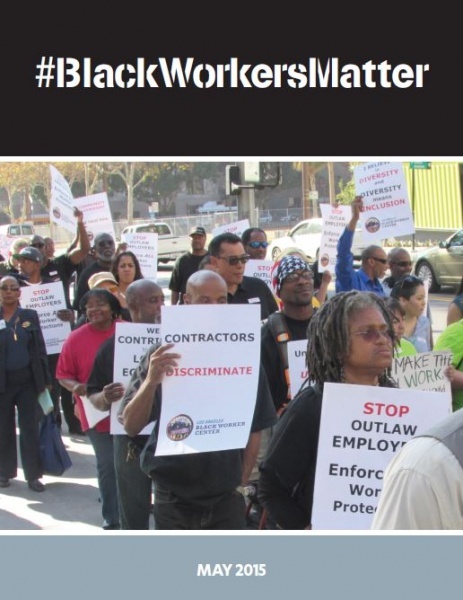May 4, 2015

Building off the renewed spirit of black activism
Sparked by the #BlacksLivesMatter movement, a new report looks at the state of black workers and the economic and employment barriers they face.
The #BlackWorkersMatter report examines the real roots of the black jobs crisis and the potential of community organizing to address the twin crises of high unemployment and low wages. The report features chapters from five experts and concludes with a set of recommendations for organizers, funders, and policymakers to improve the lives and prospects of black people in America.
“When we say #BlackLivesMatter, we are also saying that the quality of those lives matters.”
Sean Thomas-Breitfeld, Co-Director of Building Movement Project, one of the authors of the report, says, “Economic opportunity is fundamental to the quality of black lives. Several years after the Great Recession, we see that black workers are still facing a jobs crisis with no end in sight.”
In the report’s first chapter, “Working While Black: The State of Black Worker Organizing in the U.S.,” Thomas-Breitfeld conducted 29 interviews with community organizers, national experts, and foundation staff to capture the landscape of labor organizing within black communities.
Among Thomas-Bretfield's findings:
- The #BlackLivesMatter movement has increased the sense of urgency and energy in community organizing around black issues, but organizations are still challenged to develop campaign narratives that also address anti-black racism.
- Black worker organizing is a relatively new and emerging field. Of the 13 state and local organizations interviewed, only three were founded before 2005.
- The pressing demands for jobs leads to a wide variety of campaigns, from local development policies and community benefit agreements to ban the box initiatives that remove barriers to employment for people with criminal records.
“Community and worker organizing is the only way for black workers to challenge the structural barriers that maintain and advance social, political, and economic inequality in black communities,” said Thomas-Breitfeld.
“Black workers need to build enough political and institutional power to change policies that have left black workers behind everyone else.”
Among its recommendations, the #BlackWorkersMatter report finds:
- Black worker organizing must be integrated among racial and economic justice funders to reinforce the links between these issues and organizations.
- The scale of funding for black worker organizing must be drastically increased and sustained for several years.
- Investment must be made in black leadership development to train and support the next generation of black organizational leaders.
Access the #BlackWorkersMatter report here
Posted by:
